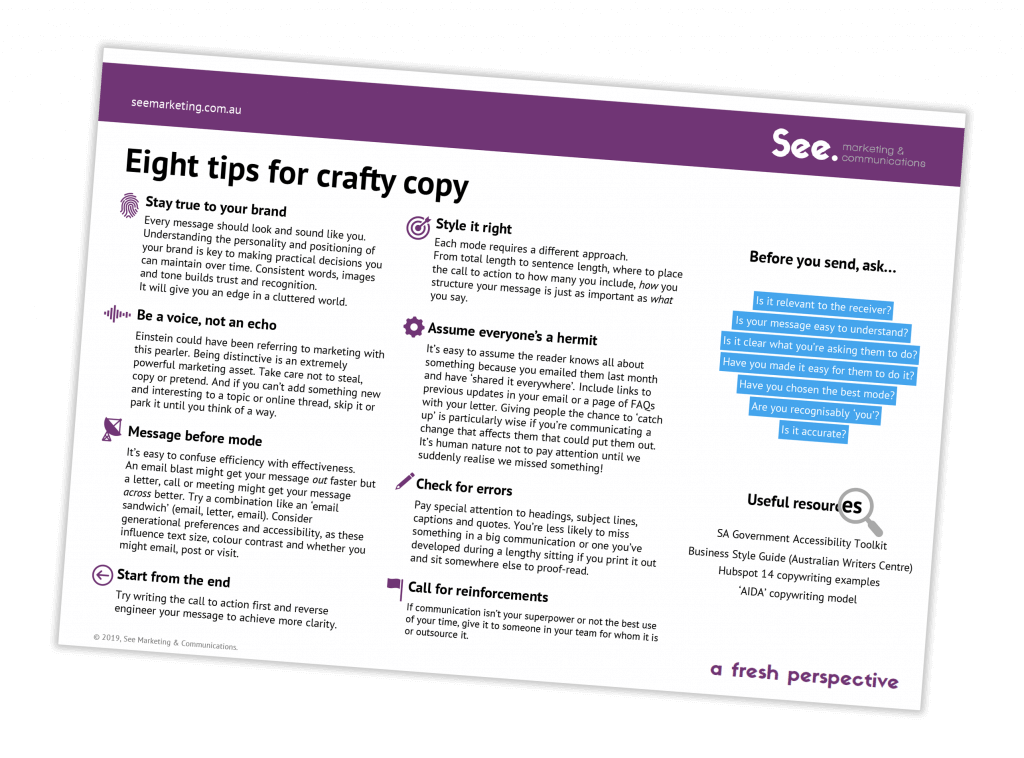
Having learned a thing or two about running a business while laid up with a broken ankle last year, here are my tips to communicating the measures you are taking to provide continuity of service, and surviving if you find yourself in a self-imposed or forced exile.
Get on the front foot – publish a business position statement
Unlike an ankle break, we know COVID-19 could disrupt business in some way at any time. If you haven’t already, now is the time to work out how you’re going to do business for the next few months and what measures you might put in place.
- Will you still have face to face meetings?
- Are you switching to virtual meetings as standard?
- Have you placed hand sanitiser throughout your office?
- Will you encourage your people to work from home?
- Are you cleaning public spaces more often or using gloves for tasks like cash-handling if you’re in retail?
You know what’s best for your business but look around for inspiration too. Once you’ve worked out your plan – even if it is ‘business as usual’ – write a short, simple statement and publish it on your website and social media channels. It should acknowledge the risk, communicate that you’re open for business and show you’re a responsible corporate citizen. Unless you’re in a high-risk industry, less is more. You can read ours on the contact page.
Tell your clients or customers direct by phone or email if your measures are likely to have a big impact on their experience of doing business with you. Do this before you publish your statement publicly. You may need to give them more detail.
Once you’ve published your positioning statement, keep an eye on information from health authorities. Revise your measures and update your statement if necessary as new information comes to hand. Take care to sound calm and measured.
10 tips to surviving isolation at home
The current advice from health authorities is to isolate ourselves at home if we have been in contact with someone who has tested positive for COVID-19, test positive ourselves or show symptoms.
Any forced confinement has the potential to drive us stir-crazy, particularly if we’re feeling reasonable well or have no symptoms ourselves. Here are my ten tips based on things that helped me survive eight weeks working from my recliner with a broken ankle.
- Tell people your situation. Explain you’ll be camping at home for a while and share any relevant information. This might be that you’re still be working or to ask family and friends not to drop in until you tell them otherwise. They’ll appreciate your consideration.
- Play background music. Music helped me feel connected to the world. I took up an Apple music subscription but Spotify or streaming an online radio station are options too. Commercial radio stations work if you don’t mind the ads. I chose music for different activities: instrumental for editing and writing, songs I could sing along to for everything else.
- Engage with your online communities. You might belong to groups on Facebook or LinkedIn that you don’t usually engage with. Make a deliberate effort to be responsive to posts. You can make some great connections and learn valuable new things with just a little effort.
- Look beyond your newsfeed. Not everything your connections post on social media show in your newsfeed. Take an extra step – look up the profile of people you haven’t heard from in a while, see what they’ve been up to and send them a message to say hello. Similarly, check your phone contacts too and send texts.
- Set an alarm for coffee and lunch breaks. Your fridge and pantry can have the gravitational pull of a black hole when you work from home. Try setting alarms for coffee and lunch breaks and having healthy snacks in easy reach so you aren’t tempted to raid the kitchen when you’re hungry or need a break in concentration. Find alternatives to food-based breaks. I used to jump on my piano and sing a few tunes when I needed a break to reset.
- Get your shopping home delivered. Shopping for groceries online is easy and delivery is available in most areas. You’ll also be helping to keep someone employed as delivery drivers tend to be casual workers. As a courtesy, wipe down your doorbell after every delivery or visitor.
- Consider a daily log of your experience. If you’re a ‘sharer’ you can keep your brand awareness up by sharing something of your experience along the way. A daily photo or observation you wouldn’t otherwise notice works. It doesn’t have to be work-related. I did some of this when I broke my ankle and I can’t tell you how many people it prompted to contact me and say hello.
- Tackle your ‘one day I must’ list. We’ve all got things we know we need to do that we never get around to. It might be updating our website, sorting out an IT issue or just reviewing our strategic direction. People will expect you to be less accessible even if you’re working through your confinement, so this is a perfect time to tackle something that’s been languishing on your list for a while.
- Spend your government stimulus handout. Millions of sole traders and casual workers in Australia missed out in the Federal Government’s economic stimulus package. If you’re one of the lucky ones, keep spending. Hoarding money, like hoarding toilet-paper, is completely pointless.
- Do things you enjoy. With no meetings or commute, you’ll have extra time in your day. If you’re well enough to work, use that time for on hobbies and interests. If fitness is your thing, look up online workout routines. My sturdy dining table and bench made great alternatives to fancy gym equipment for arm and core work. If you’re not well, do rest. You can get good recommendations on TV series you can binge-watch if you jump on Facebook and ask your connections. Do what you need to do to maintain a healthy body and mind so you can get back on your feet as quickly as possible.
Finally, for those of us who get through this relatively untouched, let’s keep an eye out for those who are doing it tough. Sending a message to wish them a speedy recovery and sending work their way when they’re recovered are some of the ways we can look after each other.
Do you have any tips on surviving isolation or preparing your business?



